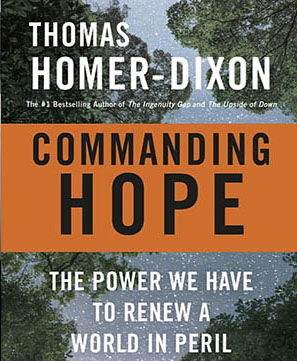Environment
The Three Biggest Obstacles to Saving the Planet
Hope for the future must combat powerful forces.
Posted December 12, 2020 Reviewed by Lybi Ma
The other day I discussed three reasons it’s not too late to hope for the planet’s future, based on an interview with political scientist Thomas Homer-Dixon.

Homer-Dixon’s reasons for (guarded) optimism were based on his new book: Commanding Hope: The Power We Have to Renew a World in Peril.
Today, in an editorial in The New York Times, Al Gore talked about “Where I find hope.” Besides being former vice-president of the U.S., Gore is a prominent environmentalist and author of An Inconvenient Truth: The planetary emergency of global warming and what we can do about it. In today’s Times editorial, Gore discussed several reasons for optimism about the planet’s future, including the fact that clean energy is rapidly becoming less expensive than gas and coal, and that new investments in green energy are actually perched to be much more profitable than continuing to prop up the gas and coal industries. Gore also notes that political leaders around the world, even some conservatives, are stepping up to join with young grass-roots activists such as Greta Thunberg now marching in the streets to demand that their elders don’t destroy the planet.
But before you get too confident that everything is going to be OK with planet Earth, it is worth taking a really careful look at exactly how daunting the task is. Remember, too, that a decade after Gore’s warning about global warming, U.S. voters elected Donald Trump, who has done everything he could to undermine not only the Environmental Protection Agency, but also to quit the Paris climate agreement, and to create as many roadblocks as he could to undermine climate action. And because of the electoral college, Trump, with 7 million fewer votes than Biden, nevertheless came within four states of winning another four more years in office.
Homer-Dixon observed that the electoral college is responsible for the single biggest setback to the planet’s future in modern times. Besides allowing Trump to ascend to the presidency with 3 million fewer votes than Hillary Clinton, the electoral college was also responsible for Al Gore losing his bid for the presidency. In the popular vote, Gore beat G.W. Bush by over half a million votes. But of the 6 million votes cast in Florida, Bush won by the tiny margin of 537 votes, and so (with a little help from a conservative Supreme Court), Bush became president. Gore would likely have encouraged massive investments in green energy and conservation. Instead, Bush and his vice-president Dick Cheney owed much of their considerable wealth to the oil industry, and acted accordingly.
The three biggest obstacles to hope
In his interview with me, Homer-Dixon discussed not only the three biggest reasons to be hopeful about saving the planet, but also the three biggest obstacles. Homer-Dixon said there were more than three obstacles, but the top roadblocks are: 1) the structural power of vested interests, 2) the fragmentation of our shared understanding of reality (aka bubbles of antiscientific ignorance), and 3) the conventional notion of economic growth.
Vested interests refer to economically powerful groups that don’t want to see change. These include the oil and coal companies, and the auto industry. Ever since the days of Standard Oil and the Teapot Dome Scandal, those industries have had outsized access to the levers of power, and they have pulled those levers to oppose regulation, to prevent change, and to try to undermine knowledge of the problems caused by dependence on fossil fuels. One tactic used by the vested interests is to attack scientists who attempt to raise warnings.
Homer-Dixon also points to “epistemic fragmentation” as a giant obstacle. For a democracy to function, and for us to work together to solve problems such as climate change, economic inequality, or viral pandemics, we need a broadly shared consensus on the facts. Those facts need to be grounded in objective science rather than wishful thinking. But disinformation campaigns, social media bubbles, and self-serving political actors (working for the powerful vested interests) have tried to tear apart the scientific consensus, and created bubbles where “alternative facts” reign supreme over objective scientific discussion.
Why is the “conventional notion of economic growth” also a major obstacle to saving the planet? The problem is the belief that everything we value – material resources, peace, freedom, and personal well-being, depend on continual growth. And there is an associated myth that new technologies will solve all the problems. Homer-Dixon calls this “techno-optimism.” But actually those new technologies themselves demand tremendous energy resources, and despite all the advances, have not served to reduce overall energy usage. While we keep thinking “technology will solve the problem tomorrow,” irreversible changes are taking place, such as the loss of fish species and forests.
Homer-Dixon argues that we need to radically rethink economic growth, and make it much less materially intensive. Instead of hopping on a plane or a cruise ship for our next vacation, we should consider hanging out in the yard and reading a novel. Instead of flying to a conference, or commuting long distances to the office, we should take advantage of what we’ve learned during the pandemic: stay home and have a zoom meeting.
In the interview, available here, Homer-Dixon discusses those obstacles (beginning around 11:50 into the video).
We also talked about what can be done to tackle these obstacles, and join Al Gore in dialing up our hopefulness. But I'll save that for a later post.
References
Homer-Dixon, T. (2020). Commanding Hope: The power we have to renew a world in peril. Toronto: Knopf Canada


